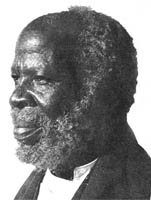Classic DACB Collection
All articles created or submitted in the first twenty years of the project, from 1995 to 2015.Kivebulaya, Apolo (C)

Who befriended the Abambuti [forest people]?
Who loved them greatly?
It is Apolo Kivebulaya,
A great lover.
– Pygmy hymn
Apolo Kivebulaya spent decades building the church in East Africa, going by foot through dense forests, patiently becoming the friend of rural farmers and pygmies, learning their languages, eating their food, sleeping in their huts, and translating the Gospels into local languages.[1] After one such visit with Europeans in which 115 persons were confirmed, the pygmies told him, “How good God is to join us together with the Europeans. We have never before seen so many Europeans together [five!] and they greeted us with faces that did not despise us.” A person of consistent energy during his thirty-eight years as a missionary, he was fond of quoting a local proverb: “He who waits till it goes by spears the tail,” or “Procrastination is the thief of time.”
It was in 1894, when he was about thirty years old, that Kivebulaya asked for baptismal instruction from the missionaries. His reading had led him to the catechism, and he fixed on the biblical phrase “Go ye into all the world and preach the Gospel.” He selected the baptismal name Apollos, “the eloquent man, well-versed in the Scriptures” (Acts 18:25). Kivebulaya was not a traditional name, but meant “the thing from England,” referring to Kivebulaya’s scarlet military jacket, which may have been given to him by an English officer. Armed with Bible, sleeping mat, and such possessions as he could carry, the new Christian set out into the countryside as a teacher. “I started work preaching the things of God. God was very kind to me in all my work for Him …. I found fifty readers.., and they were building a small church thirty feet long.., so I found great joy from preaching and teaching the Gospel …. It was quite different from anything else.” Later he would be ordained deacon and priest in the Church of England.
Soon Kivebulaya was asked to be a missionary in the nearby Congo. Here the missionary teacher, with his box of reading sheets and Gospels, set out on one of his lengthy bush visitations. Local opponents of the African Christians were numerous, fearing that the Christians would instruct the region’s women to become independent and to question traditional authorities. Kivebulaya described one attack: “They came with spears and sticks and surrounded my house, and I was inside it. They stuck the spears through the walls, as a fisherman would spear fish in a basket trap. They were afraid to come into the house, in case I had a spear, but I had none. Then I started to pray. When they could not break through they left off.”
As was the case for many Africans, aspects of Kivebulaya’s belief came to him in visions. Several times he saw a man standing beside him, a brother who urged him to go preach in the forest “because I am with you.” Once, during a dark moment when he was pursued by enemies, Kivebulaya wrote,
Jesus Christ appeared to me in a dream in the night when I was doubting if I could endure being bound and prodded with spears, and my house being burned, being beaten every day and reviled and looked at with evil eyes. These were the things that were driving me from the Congo. When I was thinking about these things I saw Jesus Christ shining like the sun, and He said to me, “Be of good cheer, I am with you.” I answered and said: “Who is speaking to me?” He replied the second time saying, “I am Jesus Christ. Preach to my people. Do not be afraid.” These were the things of my dream and they are quite true. Since that year until now when I preached to the people they turned quickly from their customs and repented.
As he grew old, he asked to be buried with his head toward the forest, for it was the custom to bury people with their head pointed toward their home. “I am still going toward the forest to preach the Gospel; even now my spirit is toward my work.” His earthly possessions were two cows, which he gave to a church, while asking that his table, chairs, and kettle be sold to pay teachers’ salaries. He died on May 30, 1933.
A prayer in the Luganda language was found after Kivebulaya’s death in a small pocket diary he always carried with him:
O God and Father,
and His Son Jesus Christ, and the Holy Spirit,
may you give me a blessing while in this world,
while you lead me through the forests, through the lakes and mountains,
so that I may do your work among your people,
Grant that I may be loved by you
and by your people. Amen [2]
Frederick Quinn
Notes:
-
Anne Luck, African Saint: The Story of Apolo Kivebulaya (London: SCM Press, 1963).
-
Ibid., 137.
This article is reproduced, with permission, from African Saints: Saints, Martyrs, and Holy People from the Continent of Africa, copyright © 2002 by Frederick Quinn, Crossroads Publishing Company, New York, New York. All rights reserved.



